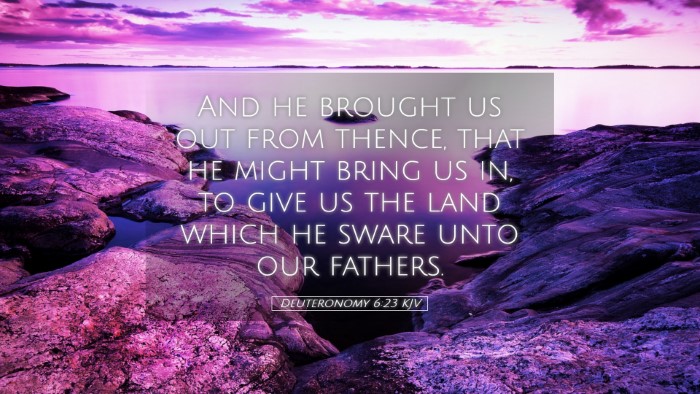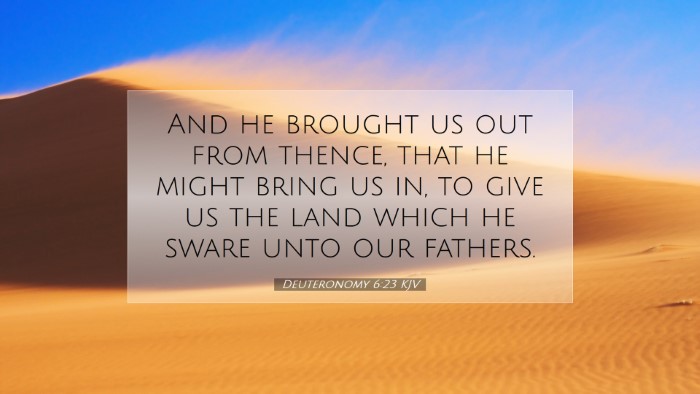Commentary on Deuteronomy 6:23
Deuteronomy 6:23 states: "And he brought us out from thence, that he might bring us in, to give us the land which he sware unto our fathers." This verse captures the essence of God's deliverance and His covenantal promise to His people. The reflections from various public domain commentaries provide rich insights into this significant passage.
Contextual Overview
Deuteronomy serves as a restatement of the law for the Israelites, preparing them to enter the Promised Land after years of wandering in the wilderness. This chapter emphasizes the importance of remembering God's mighty acts and maintaining a covenantal relationship with Him.
The Theological Significance
1. Divine Deliverance
According to Matthew Henry, the phrase “he brought us out” signifies God's initiative in salvation. It is an acknowledgment of the Israelites' former state of bondage in Egypt, from which God delivered them. The act of remembrance is crucial for spiritual vitality; it roots the people in gratitude for their redemption. Henry emphasizes that God's deliverance was not merely an escape from slavery but a profound transformation intended to guide them into a new existence.
2. The Transition to Inheritance
Albert Barnes highlights the latter part of the verse, which notes God’s intention to “bring us in” — a direct reference to the land promised to Abraham, Isaac, and Jacob. This journey from captivity to inheritance serves as a motif of spiritual journeying for believers, showcasing a God who not only frees but also fills us with promise and purpose. Barnes emphasizes that our understanding of God’s deliverance should propel us toward faithfulness in following His commands in anticipation of His promises being fulfilled.
3. Covenant Faithfulness
Adam Clarke remarks on the phrase “to give us the land.” This stress on the land signifies the fulfillment of a covenant, illustrating God’s commitment to His promises. Clarke suggests this served as a reminder to the Israelites of the faithfulness of God, urging them to remain faithful in their covenant obligations. The land represented more than mere property; it was a tangible manifestation of God’s promise and blessing. The idea of inheritance tied to faithfulness invites believers today to reflect on their own response to God’s grace and promises.
Practical Applications
This verse has significant implications for our spiritual lives today:
- Remembrance: Like the Israelites, believers are called to remember God’s past deliverances in their lives as a foundation for their faith.
- Anticipation: Just as God promised the Promised Land, believers today can have hope in the future promises laid out in Scripture, reminding us to live in light of His truth.
- Covenantal Living: This verse urges a communal aspect where God’s people are called to live within the boundaries of His commandments, epitomizing holiness in every aspect of life.
Conclusion
Deuteronomy 6:23 resonates deeply with the themes of deliverance, inheritance, and fidelity to God’s covenant. As observed in the insights of Matthew Henry, Albert Barnes, and Adam Clarke, this verse encapsulates a pivotal truth: that God acts to redeem His people with the ultimate purpose of bringing them into a blessed relationship with Himself. Thus, for pastors, students, theologians, and Bible scholars, the rich meaning embedded in this verse invites ongoing meditation and application in our spiritual journeys.


